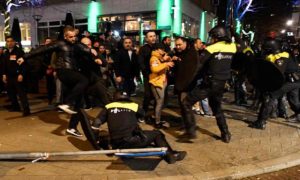
Pat Buchanan: Is Turkey Lost to the West?
03/13/2017
Not long ago, a democratizing Turkey, with the second-largest army in NATO, appeared on track to join the European Union.
That’s not likely now, or perhaps ever.
Last week, President Recep Tayyip Erdogan compared Angela Merkel’s Germany to Hitler’s, said the Netherlands was full of "Nazi remnants" and "fascists," and suggested the Dutch ambassador go home.
What precipitated Erdogan’s outbursts?
City officials in Germany refused to let him campaign in Turkish immigrant communities on behalf of an April 16 referendum proposal to augment his powers.
When the Netherlands denied Turkish Foreign Minister Mevlut Cavusoglu landing rights, he exploded, saying: "The Netherlands … are reminiscent of the Europe of World War II. The same racism, Islamophobia, xenophobia, anti-Semitism."

When Turkey’s family and social policies minister, Betul Sayan Kaya, drove from Germany to Rotterdam to campaign, Dutch police blocked her from entering the Turkish consulate and escorted her back to Germany.
Liberal Europeans see Erdogan’s referendum as a power grab by an unpredictable and volatile ruler who has fired 100,000 civil servants and jailed 40,000 Turks after last summer’s attempted coup, and is converting his country into a dictatorship.
This crisis was tailor-made for Geert Wilders, the anti-EU, anti-Muslim Dutch nationalist who is on the ballot in Wednesday’s Dutch general election.
Claiming credit for the tough stance of conservative Prime Minister Mark Rutte, Wilders tweeted: "I am telling all Turks in the Netherlands that agree with Erdogan: GO to Turkey and NEVER come back!"
"Wilders is a racist, fascist Nazi," replied Cavusoglu.
Wilders had been fading from his front-runner position, but this episode may have brought him back. While no major Dutch party would join a government led by Wilders, if he runs first in the election March 15, the shock to Europe would be tremendous.
Rutte, however, who dominated the media through the weekend confrontation with the Turks, could be the beneficiary, as a resurgent nationalism pulls all parties toward the right.
All Europe now seems to be piling on the Turks. Danes, Swedes and Swiss are taking Europe’s side against Erdogan.
Marine Le Pen, leader of the populist National Front in France, called on the socialist regime to deny Turkish leaders permission to campaign in Turkish communities. She was echoed by conservative party candidate Francois Fillon, whose once-bright hopes for the presidency all but collapsed after it was learned his wife and children had held do-nothing jobs on the government payroll.
On April 23 comes the first round of the French elections. And one outcome appears predictable. Neither of the major parties — the socialists of President Francois Hollande or the Republicans of ex-President Nicolas Sarkozy — may make it into the May 7 finals.
Le Pen, the anti-EU populist who would lift sanctions on Putin’s Russia, is running even with 39-year-old Emmanuel Macron, a socialist running as the independent leader of a new movement.
Should Le Pen run first in April, the shock to Europe would be far greater than when her father, Jean-Marie Le Pen, made the finals in 2002.
At the end of 2017, neither Wilders nor Le Pen is likely to be in power, but the forces driving their candidacies are growing stronger.
Foremost among these is the gnawing ethnonational fear across Europe that the migration from the South — Maghreb, the Middle East and the sub-Sahara — is unstoppable and will eventually swamp the countries, cultures and civilization of Europe and the West.
The ugly and brutal diplomatic confrontation with Turkey may make things worse, as the Turks, after generous payments from Germany, have kept Syrian civil war refugees from crossing its borders into Europe. Should Ankara open the gates, a new immigration crisis could engulf Europe this spring and summer.
Other ethnonational crises are brewing in a familiar place, the Balkans, among the successor states born of the 1990s breakup of Yugoslavia.
In Bosnia, secessionists seek to pull the Serb Republic away from Sarajevo toward Belgrade. The Albanian minority in Macedonia is denouncing political discrimination. The Serbs left behind after Kosovo broke loose in 1999, thanks to 78 days of U.S. bombing of Serbia, have never been reconciled to their fate.
Montenegro has charged Russia with backing an attempted coup late last year to prevent the tiny nation from joining NATO.
The Financial Times sees Vladimir Putin’s hand in what is going on in the Western Balkans, where World War I was ignited with the June 1914 assassination of the Austrian archduke in Sarajevo.
The upshot of all this:
Turkey, a powerful and reliable ally of the U.S. through the Cold War, appears to be coming unmoored from Europe and the West, and is becoming increasingly sectarian, autocratic and nationalistic.
While anti-immigrant and anti-EU parties across Europe may not take power anywhere in 2017, theirs is now a permanent and growing presence, leeching away support from centrist parties left and right.
With Russia’s deepening ties to populist and nationalist parties across Europe, from Paris to Istanbul, Vlad is back in the game.
Patrick J. Buchanan needs no introduction to VDARE.com readers; his books State of Emergency: The Third World Invasion and Conquest of America, and Suicide of a Superpower: Will America Survive to 2025? are available from Amazon.com. Patrick J. Buchanan is the author of the new book “The Greatest Comeback: How Richard Nixon Rose From Defeat to Create the New Majority.“

![51-sjuXJb6L[1]](/wp-content/uploads/2014/07-sjuXJb6L1-198x300.jpg)